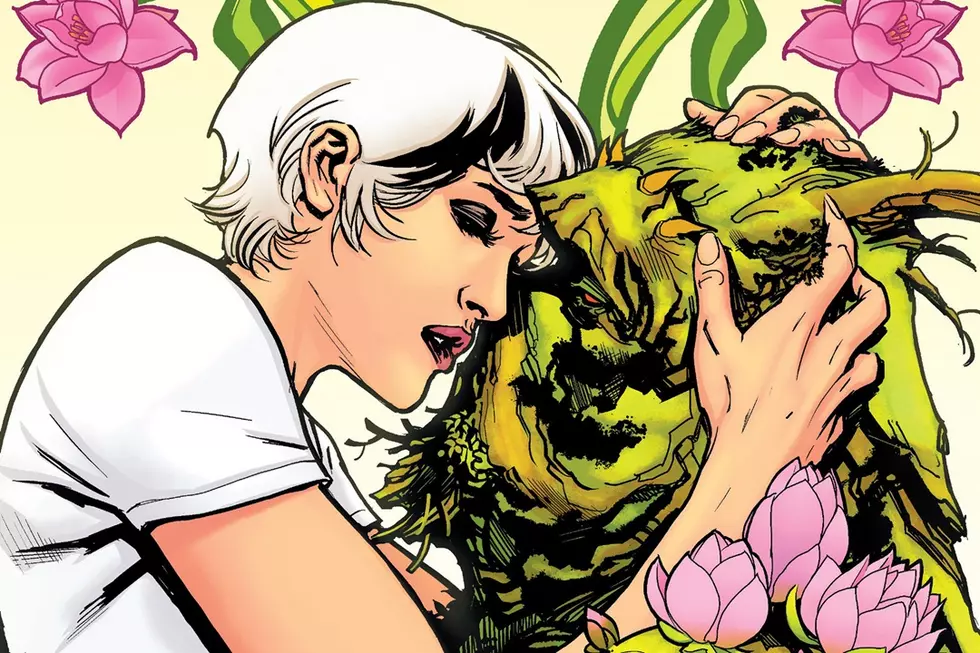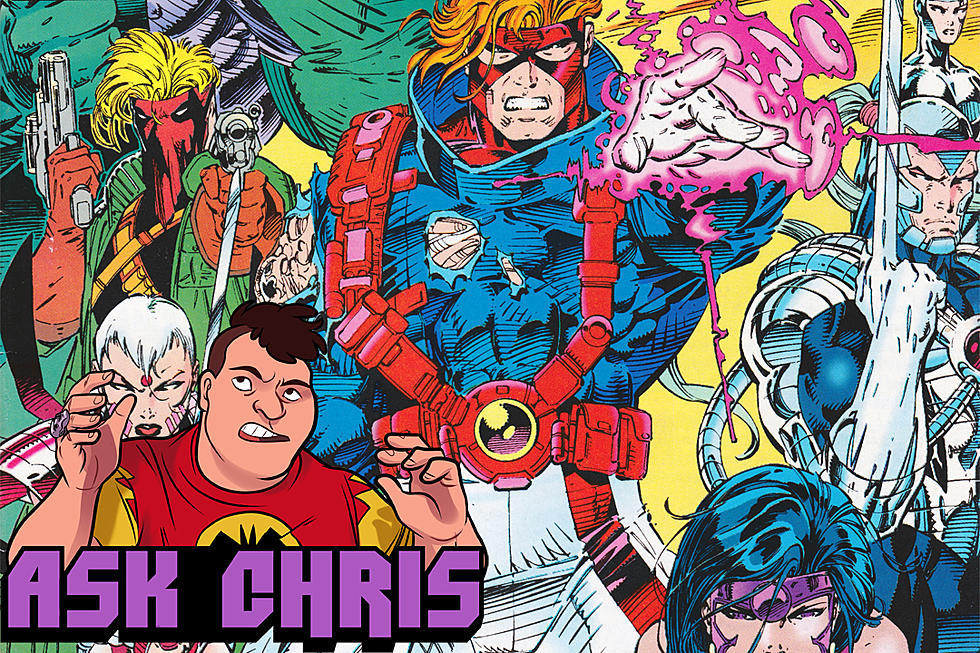
DC Rebirth: Is Geoff Johns Selling Out DC’s Future in Pursuit of its Past?
There’s a lot we still don’t know about "DC Rebirth," despite what we learned from the official announcement of the publisher's latest linewide relaunch yesterday. To begin with, there are no creative teams announced. No matter how familiar you are with a character, it’s impossible to guess what a book will be like if you don’t know who will be writing, drawing, and coloring it.
We don’t even know if the relaunched books will keep the same creative teams, or if this is a total line-wide shake-up. There are books I’d love to see get new creators, like Wonder Woman. And likewise there are books where I’d be afraid to see a shake-up, like Batgirl. But DC Comics isn’t ready to tell us any of that. What we have is a list of titles, and a CBR interview with chief creative officer Geoff Johns.
In that interview, Johns made some telling remarks:
If you look at Green Lantern: Rebirth or The Flash: Rebirth, absolutely it's targeted to fans who've read a lot of comics. Who have as many comics as me. But at the same time, people can pick it up, and there's enough in Green Lantern: Rebirth for someone to pick it up who has never read Green Lantern and understand what's happening. With DC Universe: Rebirth, it's the same thing. If you have, like me, long boxes of DC Comics, you will be very happy. If you've never read a DC comic before, you won't be too lost. This is definitely for comic book readers more than it is for casual readers, just like Green Lantern: Rebirth, but that doesn't mean it's exclusive of them.
There’s a lot to unpack here, but let’s start with the Green Lantern: Rebirth comparison. Maybe it’s true that a new reader could understand that mini-series. It’s hard for me to answer that, because I read it as a lifelong Green Lantern fan. But my question is, why would a new reader want to read Green Lantern: Rebirth, when the entire premise was, “The white guy who’s not on the Justice League cartoon is Green Lantern again. Isn’t that exciting?”
Personally I look back on Green Lantern: Rebirth as the beginning of the end of my DC super-fandom. Moving backwards is always more boring than moving forwards, and DC just got more and more excited about backwards motion from that point on. But Geoff Johns obviously thinks of Green Lantern: Rebirth as one of the most exciting things he ever did, since he's bringing it up eleven years later.
But it’s the rest of the quote that’s really disturbing. Johns' pitch to new comics readers is literally "you won't be too lost."
We've all known for a long time that superhero comics readers are getting older, and that new blood is essential to the future of the genre, and indeed the industry. But "DC You" didn't sell terribly well, so it looks like DC has decided to give up on appealing to newcomers and wants to win back the old guys.
"This is definitely for comic book readers more than it is for casual readers" says Johns. The imprecise wording here is probably not deliberate, but it is nevertheless telling. "Casual readers," that is, people who read comics casually, are being defined as a separate category from "comic book readers." One would think that anyone who reads a comic is a comic book reader, but that's never been the way gatekeeping works. As in gaming, the message is clear: casual doesn't count.
I'll be accused of reading too much into this if I point out the demographic dog-whistle, but I'm going to anyway. That's how rhetorical dog-whistles work, after all — they convey a message to an intended target while maintaining plausible deniability. And in this case, the target is not just dedicated lifelong comic book readers. I'm a dedicated lifelong comic book reader, and I'm aware enough to know when I'm being excluded.
Every time that "real fans" ("comic book readers") are pitted against "newcomers" ("casual readers"), the idea of a "real fan" is always one who is male, white, straight, and cisgender. Again, this is the same thing that's been happening in gaming. The encroaching "new/casual" fans are threatening to the "traditional" fans, not because we're new (many of us actually aren't), but because we're women, or queer, or people of color. In short, because we're invested in diversity. Because we're the sort of people who will tell you that straight white men are way overrepresented in the Justice League.
So Johns is telling the kind of fan who feels like comics aren't as specifically for him as they used to be that DC Comics is going to be just for him again. And by extension, he's telling the rest of us that DC Comics doesn't much care if we read its books or not. Oh, to be sure, we "won't be too lost," but that's hardly the same thing as being invited in and made to feel welcome.
It's possible that when we get a better look at the books themselves, this will seem like less of a problem. Gotham Academy is still there, which implies that DC hasn't entirely given up on growing a new reader base. It's hard to imagine that Batgirl will change too much, given its recent acclaim --- but until we hear for sure I don't want to make that assumption.
After all, Johns also said of Rebirth that "it's about all of us coming together --- not marching on the same narrow path, but living in the same universe again." A big part of the appeal of books like Batgirl and especially Gotham Academy is that they live in their own little chunks of the DCU, and don't depend on the reader knowing what's happening in other titles. If part of the goal is pulling continuity tighter from book to book, it's hard to imagine those books not suffering.
And of course there are books missing too, like Midnighter. The first gay male hero to have an ongoing title at DC or Marvel, canceled as DC embraces "traditional" fans. And it's true, his book could have sold better. But meanwhile, Deathstroke is getting another solo title, and when was the last time he was a best-seller? Some characters get all the chances in the world, and other characters get half a chance, once. And if the characters who get more chances are all straight white men, I suppose we're meant to believe that's coincidental?
I'm not writing off DC Comics. If they hire creators whose work I enjoy and want to support, I will check out those books. I'm curious about Superwoman, and I've been saying we needed a Supergirl book for a while now. But if Geoff Johns' comments reflect the direction of the post-Rebirth line, it's entirely likely that, despite having read DC Comics for 27 years, I will remain, by any definition, a casual reader.
More From ComicsAlliance




![Fantastic Five: Best Comic Book Couples [Love & Sex Week]](http://townsquare.media/site/622/files/2017/02/couples.jpg?w=980&q=75)

![‘Joker Loves Harley’ Comes To An Explosive End In ‘Harley Quinn’ #13 [Exclusive Preview]](http://townsquare.media/site/622/files/2017/01/HQ00.jpg?w=980&q=75)
![Kiss With A Fist: The ‘Midnighter and Apollo’ Mixtape [Music Week]](http://townsquare.media/site/622/files/2017/01/Midnighter-Featured.jpg?w=980&q=75)
![The Bat And The Cat Have A Chat In Tom King And Mitch Gerads’ ‘Batman’ #14 [Exclusive Preview]](http://townsquare.media/site/622/files/2017/01/BM_14_0.jpg?w=980&q=75)
